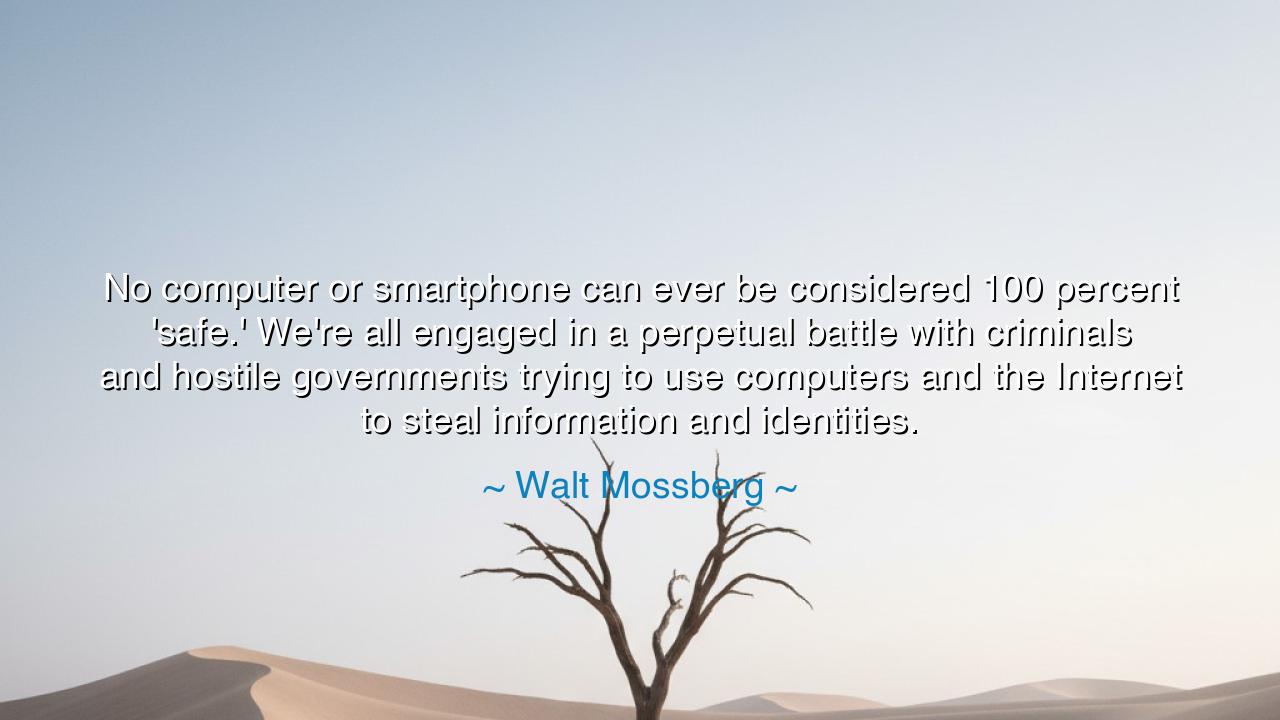
No computer or smartphone can ever be considered 100 percent
No computer or smartphone can ever be considered 100 percent 'safe.' We're all engaged in a perpetual battle with criminals and hostile governments trying to use computers and the Internet to steal information and identities.






The voice of Walt Mossberg, seasoned observer of the digital age, carries the gravity of a sage when he warns: “No computer or smartphone can ever be considered 100 percent ‘safe.’ We’re all engaged in a perpetual battle with criminals and hostile governments trying to use computers and the Internet to steal information and identities.” Though these words speak of circuits and screens, they echo an eternal truth older than the machines themselves — that every advance of civilization brings not only light but shadow, and that with every new power humanity must guard its virtue and vigilance.
In the age of the ancients, fortresses were built of stone and fire, guarded by sentinels with swords and torches. In our time, the fortresses are woven of data and code, and the sentinels stand unseen, behind glowing screens. Mossberg’s wisdom lies in this revelation: that while our tools have changed, the struggle between creation and corruption endures unchanged. Where once marauders sought gold and grain, now hackers and spies seek the treasures of identity — our secrets, our memories, our very names. The battlefield has moved from the earth beneath our feet to the invisible realms of the Internet, yet the war remains one of the spirit: vigilance versus complacency, truth versus deceit.
The ancients, too, understood that the greater the gift, the greater the danger that accompanies it. Prometheus, who brought fire to mankind, was both a savior and a rebel; his flame illuminated the world but also brought destruction when misused. So too with our digital fire — the computer, the smartphone, the network. They grant us knowledge and connection beyond imagination, yet they also expose us to manipulation, to theft, to unseen hands that reach across the world to claim what is ours. Mossberg’s words are a modern echo of this myth: power without wisdom invites peril.
Consider the story of the 2017 WannaCry cyberattack, when malicious code spread like a plague across the world. Hospitals, banks, and governments found their systems locked, their data ransomed by faceless criminals. It was not armies or bombs that caused the paralysis, but a few lines of digital poison. The lesson was harsh and clear — in a connected world, even a moment’s carelessness can unleash chaos. Mossberg, long before and after such events, reminded humanity that security is not a destination but a discipline, a constant struggle requiring both knowledge and humility.
Yet his words are not meant to sow fear, but to awaken awareness. He speaks of a “perpetual battle,” but not one fought with despair. For though danger is constant, so too is the ingenuity of the human spirit. Just as the guardians of old patrolled their walls each night, we too must guard our digital gates — not only with passwords and encryption, but with wisdom and discernment. To be safe in this age is not merely to hide from threats, but to understand them, to live with awareness rather than illusion.
Beneath Mossberg’s warning lies a profound moral truth: nothing made by man is perfect, and safety without vigilance is a dream. The wise do not seek invulnerability, for such a state does not exist; instead, they seek resilience. In this, there is ancient wisdom reborn — that one must not trust blindly in tools or institutions, but remain ever mindful of one’s own duty to protect what is precious. Just as a shepherd guards his flock, so must we guard our data, our privacy, our humanity amid the machines.
So, let his words be a torch passed to the generations: Do not be lulled by convenience, nor trust entirely in the guardians of technology. The responsibility of security lies not only in companies or governments, but in each soul that touches the web. Learn the ways of protection, question what you share, and remember always that even the brightest device casts a shadow. For this is the essence of Mossberg’s truth — that in a world of endless connection, the greatest defense is consciousness.
And thus, the lesson endures: Be not fearful of the digital world, but walk through it with open eyes. Use its gifts, but do not bow before them. Honor the power of technology, yet never forget the ancient art of vigilance. For though no computer or smartphone is ever truly “safe,” the heart that is wise, the mind that is watchful, and the spirit that is awake — these remain the surest shields against the storms of the modern age.






AAdministratorAdministrator
Welcome, honored guests. Please leave a comment, we will respond soon